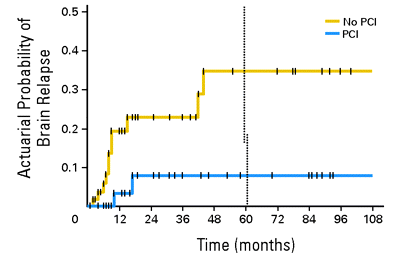|
||||
| Purpose: To investigate the
role of prophylactic cranial irradiation (PCI)
within a trimodality protocol (chemotherapy, chemoradiotherapy,
surgery) for patients with operable stage IIIA non–small-cell
lung cancer (NSCLC).
Patients and Methods: After mediastinoscopic staging, patients with operable stage IIIA NSCLC were enrolled to a German multicenter trial and randomly assigned to receive either primary resection followed by adjuvant thoracic radiation therapy (50 to 60 Gy; arm A) or preoperative chemotherapy (cisplatin/etoposide [PE]; three cycles) followed by concurrent chemoradiotherapy (PE plus 45 Gy; 1.5 Gy twice per day) and definitive surgery (arm B), respectively. Patients in arm B were scheduled to receive PCI (30 Gy; 2 Gy daily fractions). Results: One hundred twelve patients were randomly assigned between November 1994 and July 2001. One hundred six patients were eligible (arm A: 51, arm B: 55), 90 males and 16 females, 50 with squamous cell, 16 with large cell, five with adenosquamous, and 35 with adenocarcenoma (median age, 57 years; range, 37 to 71 years). Forty-three patients received PCI as scheduled in arm B. Eleven long-term survivors (arm A: four; arm B: seven) underwent a comprehensive neuropsychological examination. PCI significantly reduced the probability of brain metastases as first site of failure (7.8% at 5 years v 34.7%), the overall brain relapse rate was reduced comparably (9.1% at 5 years v 27.2%). A slightly reduced neurocognitive performance in comparison with the age-matched normal population was found for patients in both treatment groups. No significant difference between patients who were treated with or without PCI could be noted. Conclusion: PCI is effective in preventing brain metastases following this aggressive trimodality approach. Neurocognitive late effects are not significantly different between patients treated with or without PCI. |
